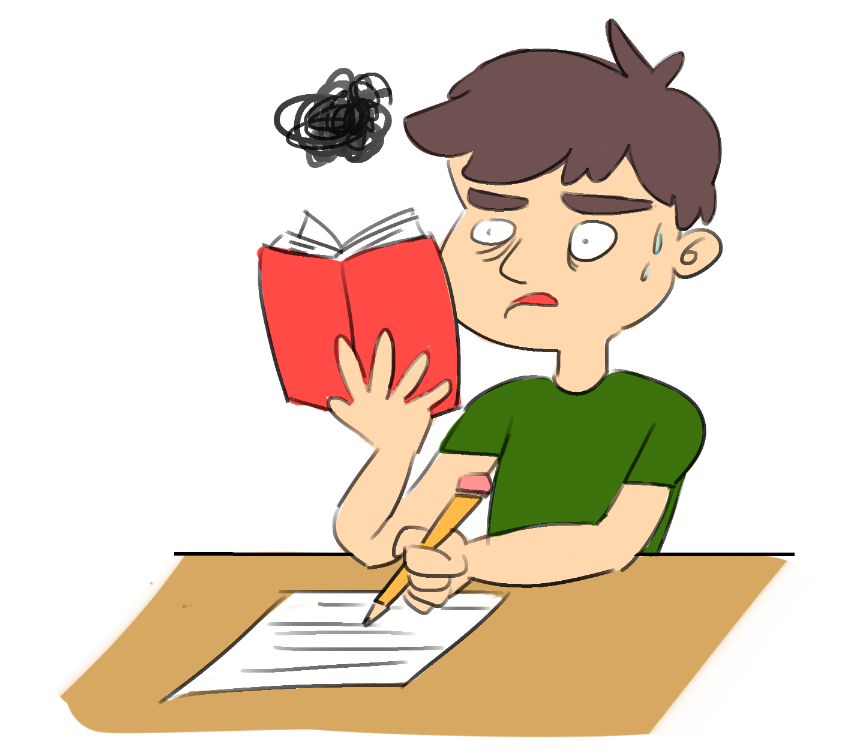Are high school students too stressed out?
Students are constantly stressed by the amount of work they must complete. Let’s try to change that.
January 30, 2019
Homework, quizzes, tests, sports, music practice and a variety of club activities. It is very likely that the average high school student is juggling all of these and still attempting to go to bed at a reasonable hour. Add in the fact that many high school students must wake up before 7 a.m. to make it to school on time, mix in a little bit of social pressure to conform, and you have a recipe for teenage stress.
It is pretty startling that if you ask any high school student about whether and why they are stressed, chances are that they will reply with a resounding YES and a lengthy list of school-related assignments, upcoming tests and extracurricular commitments. It is no wonder that according to a 2013 survey conducted by the American Psychological Association, almost one-third of teens report feeling overwhelmed as a result of stress.
If this feeling of overwhelming stress continues to grow, it can manifest itself in a variety of unpleasant ways.
“I bottled up so many emotions and stress, and then that little tiny thing just set me off.”
-Freshman Eugene Kimelman
Freshman Eugene Kimelman said, “Before I found a coping mechanism, there were points where I’ve literally…exploded because I bottled up so many emotions and stress, and then that little tiny thing just set me off.” Anger outbursts, depression, anxiety and a lack of concentration are all symptoms of stress, and the feeling of a loss of control resulting from these symptoms may even exacerbate a teen’s stress levels.
The effects of stress are not only emotionally and mentally taxing; they can affect students physically as well. According to the same 2013 survey conducted by the APA, 32 percent of teens say they experience headaches, 26 percent report changes in sleeping habits, and 23 percent have skipped a meal because of stress. Teenagers already deal with changing hormones, embarrassing voice cracks, awkward period situations and annoying acne flare-ups, so the enormous amounts of stress from school and extracurriculars seem to be a cruel addendum to an already stressful time.
Unfortunately, the amount of stress high school students have to deal with is likely to grow. Many students have dreams of attending top universities, but it is getting harder and harder to be accepted into these prestigious institutions as more students apply with more impressive-sounding resumés. There exists a certain pressure to do as many extracurriculars as possible, join club after resumé-boosting club and take as many AP or IB classes as possible, while still maintaining good grades and high test scores in order to maximize the chance of being accepted by an elite college.
Pressure from adults to do well is another stressor that cannot be ignored. When a student is performing well in school, parents and teachers may expect a student to continue their high-achieving track record, no matter how much stress the student may already be feeling. They may cast aside teenage stress as incomparable to the stresses of a mortgage, a job and other aspects of adult life, but adults must realize that high school is probably the hardest thing teenagers have ever been through, being a teenager in the 21st century presents unique challenges of their own, and the consequences of ignoring student stress are serious.
Although it seems as if stress leaves students paralyzed with a troubling assortment of mental, emotional and physical symptoms, this does not have to be the case. In the right amount, stress can play an important role for students. However, the difficult part here is that it is all too easy to cross the line between having extreme and just enough stress.
When the right amount is dealt with, stress can help increase motivation, improve time management skills and prepare students for the future where their stress levels may be even higher.
Kimelman said, “Getting used to the amount of stress in high school while you’re developing will make it so that when you have to deal with it in college, or in a job, it will [still] be stressful, but it will be less stressful than it would have been if you were not introduced to it originally.” The sooner students figure out healthy coping strategies that work for them, the better because as students get older, the consequences of burnout only increase.
As they say, pressure turns coal into diamonds, but when this pressure so often comes with chronic headaches, skipped meals, anxiety and depression, it may be time to rethink just how much stress we put on high school students.



